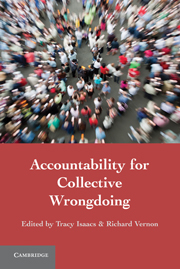Book contents
- Frontmatter
- Contents
- List of Contributors
- Acknowledgments
- Introduction
- PART I COLLECTIVE ACCOUNTABILITY IN INTERNATIONAL LAW
- PART II DISTRIBUTING ACCOUNTABILITY
- 7 Reparative Justice
- 8 The Distributive Effect of Collective Punishment
- 9 Citizen Responsibility and the Reactive Attitudes: Blaming Americans for War Crimes in Iraq
- 10 Kicking Bodies and Damning Souls: The Danger of Harming “Innocent” Individuals While Punishing “Delinquent” States
- 11 Punishing Collectives: States or Nations?
- Index
- References
8 - The Distributive Effect of Collective Punishment
Published online by Cambridge University Press: 05 June 2012
- Frontmatter
- Contents
- List of Contributors
- Acknowledgments
- Introduction
- PART I COLLECTIVE ACCOUNTABILITY IN INTERNATIONAL LAW
- PART II DISTRIBUTING ACCOUNTABILITY
- 7 Reparative Justice
- 8 The Distributive Effect of Collective Punishment
- 9 Citizen Responsibility and the Reactive Attitudes: Blaming Americans for War Crimes in Iraq
- 10 Kicking Bodies and Damning Souls: The Danger of Harming “Innocent” Individuals While Punishing “Delinquent” States
- 11 Punishing Collectives: States or Nations?
- Index
- References
Summary
Collective punishment has a notorious reputation among moral philosophers. If we take it to mean the imposition of punitive measures on groups (I elaborate on this meaning later in the chapter), collective punishment raises two normative issues that many philosophers find particularly troubling. The first concerns the extent to which groups are the appropriate subjects of punishment. Here the question is, are groups moral agents that are responsible for their actions and should be held to account when they act wrongly? The second difficulty concerns the impact of collective punishment on group members. Here the question is, is it justified to impose burdens on individuals by virtue of the fact that their group caused a collective harm?
To see these problems more clearly, consider the proposed academic boycott against Israeli universities (the subject of heated debates in recent years in British academia). Briefly, the proponents of the boycott recommend the elimination of professional ties with Israeli academic institutions, in light of the latter's alleged support of the Israeli government policies. However, does it make sense to argue that academic institutions act in a condemnable manner? Are institutions themselves the proper subject of moral reactions such as anger, resentment, or condemnation? Moreover, even if it can be shown that Israeli academic institutions acted in a way that merits condemnation, boycotting them will harm the individual academics who work in those institutions. Can this distributive effect be justified?
Information
- Type
- Chapter
- Information
- Accountability for Collective Wrongdoing , pp. 210 - 230Publisher: Cambridge University PressPrint publication year: 2011
References
Accessibility standard: Unknown
Why this information is here
This section outlines the accessibility features of this content - including support for screen readers, full keyboard navigation and high-contrast display options. This may not be relevant for you.Accessibility Information
- 9
- Cited by
